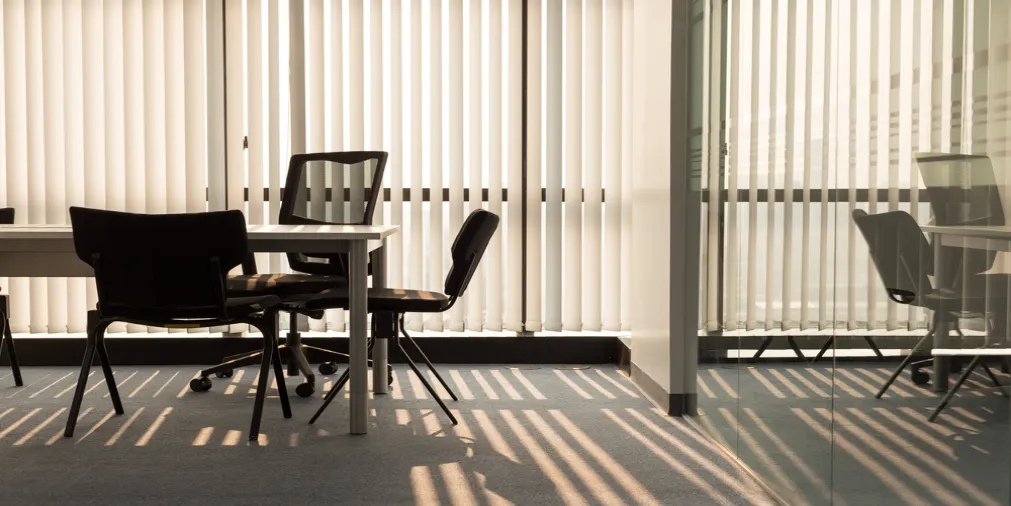Blinds can indeed improve energy efficiency during Dubai’s hot summers. Dubai experiences scorching temperatures during the summer months, and the use of office blinds dubai can help reduce the heat gain in office spaces, leading to lower energy consumption and increased energy efficiency. Blinds can indeed improve energy efficiency during Dubai’s hot summers. Using office blinds Dubai can assist limit heat gain in office areas, which will cut energy consumption and boost energy efficiency. Dubai remains extremely hot summers.
Office blinds can be more effective than curtains in energy conservation, especially in a commercial setting. Blinds often offer better control over light and heat entering a room, which can help in reducing energy costs. They can be adjusted to block direct sunlight while still allowing natural light, thereby reducing the need for artificial lighting and air conditioning.
By offering insulation and shade, office blinds dubai help to keep offices comfortable and reduce the need for unnecessary cooling. Here’s how blinds contribute to energy efficiency:
Office Blinds in Dubai:
- Heat Reduction: Blinds act as a barrier against sunlight, preventing excessive heat from entering the office space. By closing the blinds or adjusting them to block direct sunlight, you can significantly reduce the amount of heat that penetrates the room. This reduces the reliance on air conditioning systems, leading to energy savings.
- Temperature Regulation: By controlling the amount of sunlight entering the office, blinds help regulate the temperature. Excessive heat can make the office blinds dubai uncomfortable and lead to increased reliance on air conditioning. By using blinds to block or filter sunlight, you can maintain a more comfortable temperature, reducing the need for excessive cooling and saving energy.
- Glare Reduction: Blinds also help reduce glare on computer screens and other electronic devices. Glare can cause eye strain and discomfort, leading to decreased productivity. By using blinds to control the amount of natural light entering the office blinds dubai, you can create a more comfortable working environment, allowing employees to work efficiently without the need for additional artificial lighting.
- Insulation: Some types of blinds, such as honeycomb or cellular blinds, have insulating properties. These blinds have a unique cellular design that traps air, creating a layer of insulation between the window and the office space. This insulation helps to reduce heat transfer, keeping the office blinds dubai cooler during hot summers and reducing the workload on air conditioning systems.
- Energy Cost Savings: By reducing the heat gain and regulating the temperature, blinds contribute to lower energy consumption. With less reliance on air conditioning, energy costs can be significantly reduced, leading to financial savings for businesses.
It’s important to choose blinds with materials and designs that are specifically designed for heat reduction and energy efficiency. Honeycomb blinds, for example, are known for their insulating properties and can be particularly effective in Dubai’s hot climate. By using office blinds dubai to control sunlight, reduce heat gain, and regulate temperature, businesses in Dubai can improve energy efficiency during the hot summer months. This not only helps reduce energy consumption and costs but also creates a more comfortable and productive working environment for employees.
What types of blinds are best for office use?
When it comes to choosing blinds for office use, there are several options available. The best type of blinds for your office will depend on your specific needs and preferences. Here are some popular types of blinds that are commonly used in office spaces:
-
Vertical Blinds:
Vertical blinds are a popular choice for office settings. They consist of vertical slats that can be tilted to control the amount of light entering the room. Vertical blinds are versatile, easy to clean, and provide excellent privacy and light control.
-
Roller Blinds:
Roller blinds are simple and functional, making them a practical choice for offices. They consist of a single piece of fabric that rolls up and down using a chain or a motorized mechanism. Roller blinds are available in various colors and patterns, allowing you to match them with your office decor.
-
Venetian Blinds:
Venetian blinds are a classic choice for office spaces. They feature horizontal slats that can be tilted to control light and privacy. Venetian blinds are available in different materials such as aluminum, wood, or faux wood, offering a range of styles to suit your office aesthetic.
-
Roman Blinds:
Roman blinds provide a more elegant and sophisticated look to office spaces. They are made of fabric that folds up in pleats when raised and hangs flat when lowered. Roman blinds offer a softer appearance and can be customized with various fabric options to match your office decor.
-
Honeycomb/Cellular Blinds:
Honeycomb or cellular blinds are known for their energy-efficient properties. They have a unique cellular design that traps air, providing insulation and helping to regulate temperature in the office. Honeycomb blinds are available in various opacity levels, allowing you to control light and privacy.
-
Motorized Blinds:
Motorized blinds are a convenient option for office spaces, especially for large windows or hard-to-reach areas. With motorized blinds, you can control the blinds using a remote control or a smartphone app, allowing for easy adjustment of light and privacy levels.
When choosing blinds for your office, consider factors such as light control, privacy, ease of maintenance, and aesthetic appeal. It’s also essential to select office blinds dubai made from durable materials that can withstand the demands of a busy office environment. Consulting with a professional blinds supplier can help you make an informed decision based on your specific requirements.
Are Office Blinds dubai More Effective than Curtains in Energy Conversation?
Both blinds and curtains can be effective in conserving energy, but their effectiveness depends on various factors such as the material, thickness, and how well they are installed.
Blinds, especially those made of insulating materials like cellular or honeycomb blinds, can provide good insulation and help reduce heat transfer through windows. They have a unique design that creates air pockets, which act as a barrier against heat loss or gain. Additionally, blinds offer flexibility in terms of adjusting the amount of light and privacy desired.
On the other hand, curtains can also provide insulation, especially if they are made of thick, heavy fabrics like velvet or thermal curtains. They can help block drafts and reduce heat transfer through windows. Additionally, curtains can create a more decorative and cozy atmosphere in a room. Both blinds and curtains can be effective in energy conservation, but it’s important to consider factors such as material, thickness, and proper installation to maximize their effectiveness.


